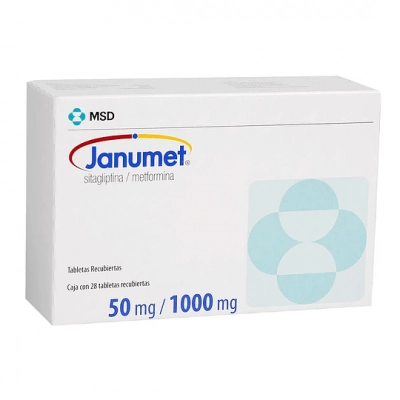Janumet
$152.77 – $444.54
Janumet
Sitagliptin, Metformin Hydrochloride
Reasons to buy

Janumet
HOW DOES JANUMET WORK?
Sitagliptin
Incretin hormones are important in glycemic control and include glucagon-like peptide-1 (GLP-1) and glucose-dependent insulinotropic polypeptide (GIP). After meals, the intestine releases these incretin hormones in response to increased blood glucose concentrations. These hormones stimulate insulin release from pancreatic beta cells, thus regulating the blood glucose levels. However, GLP-1 and GIP can be inactivated by an enzyme called DPP-4. Sitagliptin inhibits DPP-4, thus increasing incretin hormone levels and insulin release to mediate blood sugar levels.
Metformin
Metformin is a biguanide that lowers the production of hepatic glucose, lowers absorption of glucose in the intestine, and improves insulin sensitivity through increasing peripheral glucose. Insulin release does not change with metformin, however, fasting levels of insulin and day-long plasma insulin response can be lowered.
SIDE EFFECTS
- Nausea, vomiting, or stomach upset
- Diarrhea or constipation
- Headache
- Joint or muscle pain
- Back pain
- Weakness
- A metallic taste in the mouth
- Cold symptoms such as runny or stuffy nose, sneezing, and sore throat
WARNINGS AND PRECAUTIONS
Lactic acidosis
There have been multiple reports of lactic acidosis with metformin use, with some being fatal cases. Onset was typically gradual with symptoms including muscle pain, abdominal pain, drowsiness, and respiratory distress. More severe cases of acidosis included symptoms such as hypothermia, hypotension, and bradyarrhythmias. The signs and symptoms were accompanied by increased blood lactate concentrations, anion gap acidosis, and an elevated lactate/pyruvate ratio. There are multiple risk factors that increase an individual’s chance of developing lactic acidosis while on metformin. Risk factors and subsequent risk reduction measures include:
- Renal impairment – Do not use in patients with an eGFR of less than 45 mL/min/1.73 m2
- Age 65 or greater – Assess renal function more often
- Radiological studies with contrast – Discontinue Janumet prior to an iodinated contrast imaging procedure in certain patients
- Surgery – Hold Janumet while patients have restricted food and fluid intake
- Hypoxic states – Stop Janumet when hypoxic states occur, such as in acute congestive heart failure, cardiovascular collapse, acute myocardial infarction, and sepsis
- Alcohol – Avoid excessive alcohol intake
- Hepatic impairment – Do not use Janumet if patient exhibits signs of hepatic disease
Pancreatitis
Both fatal and non-fatal hemorrhagic or necrotizing acute pancreatitis cases have been reported. If a patient experiences any signs or symptoms of pancreatitis, Janumet should be stopped immediately and the pancreatitis should be managed appropriately.
Heart Failure
Other DPP-4 inhibitors have demonstrated an association with heart failure. Take caution when using Janumet in patients with a history of heart failure or renal impairment, and monitor therapy closely. If heart failure occurs while taking Janumet, consider stopping therapy.
Acute Renal Failure
There have been cases of worsening renal function, such as acute renal failure and the need for dialysis. Renal function should be evaluated before initiation of Janumet and throughout therapy. If renal dysfunction is expected to develop, like in the elderly, renal function should be evaluated more often. Stop Janumet in the case of renal impairment.
Vitamin B12 Deficiency
Studies have shown a decrease in vitamin B12 levels with the use of metformin. Monitor hematologic measures annually and vitamin B12 parameters every 2 to 3 years for patients taking Janumet. If abnormalities are present, manage appropriately with Janumet discontinuation or vitamin B12 supplementation.
Hypoglycemia with Concomitant Use of Insulin Products
Janumet can cause hypoglycemia when used in combination with other products that lower blood glucose, such as insulin. Dose adjustments to insulin may be required to prevent development of hypoglycemia.
Hypersensitivity Reactions
Sitagliptin has been shown to cause severe hypersensitivity reactions, including anaphylaxis, angioedema, and Stevens-Johnson syndrome within 3 months of starting Janumet. If these events occur, Janumet should be discontinued and alternative therapies should be explored.
Severe and Disabling Arthralgia
DPP-4 inhibitors have demonstrated severe and disabling arthralgias that subside upon drug withdrawal. If experiencing pain in one’s joints, patients should stop taking Janumet and avoid other DPP-4 inhibitors.
Bullous Pemphigoid
Monitor patients for the formation of erosions or blisters, as there have been reported cases of bullous pemphigoid with DPP-4 inhibitors. Treatment of this phenomenon usually requires hospitalization and immunosuppressive therapy. If suspected, discontinue Janumet and obtain a dermatologist referral.
DRUG INTERACTIONS
Carbonic Anhydrase Inhibitors (CAI)
Carbonic anhydrase inhibitors can lower serum bicarbonate and cause non-anion gap metabolic acidosis. When used concomitantly with Janumet, this combination can elevate an individual’s risk for developing lactic acidosis. Patients that are taking these drugs in combination should be frequently monitored. Examples of CAIs include topiramate and acetazolamide.
Drugs that Decrease Clearance of Metformin
Medications that interfere with the renal elimination of metformin should be avoided. Drugs like ranolazine, dolutegravir, and cimetidine can increase a patient’s systemic exposure to metformin and elevate the risk of lactic acidosis.
Alcohol Consumption
Patients should avoid excessive alcohol intake. Alcohol has been shown to increase metformin’s effect on lactate metabolism, causing increased risk for lactic acidosis.
Other Drugs Affecting Glycemic Control
When used in combination with other drugs that can cause hypoglycemia (such as thiazide and other diuretics), the risk for developing hypoglycemia with Janumet is increased. Patients should be monitored for signs of hypoglycemia when on concomitant glucose-altering agents such as steroids, diuretics, and phenytoin.
Other Drug Interactions
- ACE inhibitors
- beta-2-agonists
- calcium channel blocking drugs
- corticosteroids
- estrogens or estrogens plus progestogen
- isoniazid
- nicotinic acid
- oral contraceptives
- phenothiazines
- phenytoin,
- sympathomimetics
- thyroid products
| Quantity | 50mg/1000mg – 60 tabs, 50mg/1000mg – 120 tabs, 50mg/1000mg – 180 tabs, 500mg/50mg – 60 tabs, 850mg/50mg – 60 tabs |
|---|
